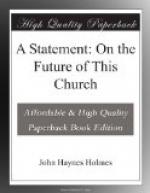In addressing this meeting, I stated in some detail the future conditions of church work which I proposed to establish or to find. I had intended originally not to make these public, at least all at once; but rumor has been busy, and exact information, for purposes of correction, if nothing more, has now become essential.
First of all, therefore, may I say that I made announcement to this meeting, as I would now make announcement to you, that I have left, or am planning to leave, the Unitarian denomination, and propose not much longer to be known specifically as a Unitarian minister. The reasons for this change in my life, I shall make plain at another time; this morning I content myself with stating the fact. Almost a year ago I resigned the office of vice-president of the Middle States Conference of Unitarian churches, which have held ever since I came to New York. Two months ago, I resigned from the Council of the Unitarian General Conference. Two weeks ago, I resigned my life-membership in the American Unitarian Association. Next May, when the new list is made up, I expect to withdraw my name from the official roll of Unitarian clergymen, and thus sever the last strand which holds me to the Unitarian body. Of course, I shall join no other denomination, and in [15] this sense shall be independent. But to me this action means not isolation, but entrance into that larger fellowship which I so long to share. No barrier will then separate me from those Episcopalians and Baptists and Methodists and other men, who are my real spiritual brethren. I shall be at one with all men everywhere—at home with the family of mankind. I shall not so much cease to be a Unitarian, as to become a Christian. This matter is of course personal; and it thus affected only incidentally the problem which was before our meeting last Monday night. It is easy to find precedent for the occupancy of a Unitarian pulpit by a minister not a Unitarian. At the time of the famous Year-Book controversy, Mr. Potter of New Bedford, Mass., and several of his colleagues, withdrew from the Unitarian body, but continued to hold their Unitarian pulpits. The latest instance of which I chance to know was called to my attention by the death last week of Prof. George A. Foster, of Chicago University. Dr. Foster was born, bred and ordained a Baptist; and yet last year was called to fill the pulpit of the First Unitarian Church church in Madison, Wisconsin; and died in the service of this church, a Baptist.
Even in orthodox churches, the denominational tag is losing its significance. Thus, when the City Temple London, the most famous Congregational church in the world, sought a successor to Dr. Campbell, it chose Dr. Joseph Fort Newton, of Iowa, a Universalist. We are getting sensible enough these days to recognize that the essential thing even about a minister is not his name but his manhood. Nevertheless, my contemplated change in denominational status might




